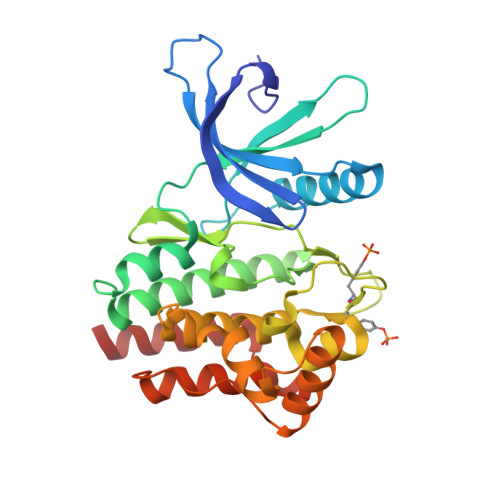Potent and Selective Inhibition of Polycythemia by the Quinoxaline JAK2 Inhibitor NVP-BSK805
Baffert, F., Regnier, C.H., De Pover, A., Pissot-Soldermann, C., Tavares, G.A., Blasco, F., Brueggen, J., Chene, P., Drueckes, P., Erdmann, D., Furet, P., Gerspacher, M., Lang, M., Ledieu, D., Nolan, L., Ruetz, S., Trappe, J., Vangrevelinghe, E., Wartmann, M., Wyder, L., Hofmann, F., Radimerski, T.(2010) Mol Cancer Ther 9: 1945-1955
- PubMed: 20587663
- DOI: https://doi.org/10.1158/1535-7163.MCT-10-0053
- Primary Citation of Related Structures:
3KRR - PubMed Abstract:
The recent discovery of an acquired activating point mutation in JAK2, substituting valine at amino acid position 617 for phenylalanine, has greatly improved our understanding of the molecular mechanism underlying chronic myeloproliferative neoplasms. Strikingly, the JAK2(V617F) mutation is found in nearly all patients suffering from polycythemia vera and in roughly every second patient suffering from essential thrombocythemia and primary myelofibrosis. Thus, JAK2 represents a promising target for the treatment of myeloproliferative neoplasms and considerable efforts are ongoing to discover and develop inhibitors of the kinase. Here, we report potent inhibition of JAK2(V617F) and JAK2 wild-type enzymes by a novel substituted quinoxaline, NVP-BSK805, which acts in an ATP-competitive manner. Within the JAK family, NVP-BSK805 displays more than 20-fold selectivity towards JAK2 in vitro, as well as excellent selectivity in broader kinase profiling. The compound blunts constitutive STAT5 phosphorylation in JAK2(V617F)-bearing cells, with concomitant suppression of cell proliferation and induction of apoptosis. In vivo, NVP-BSK805 exhibited good oral bioavailability and a long half-life. The inhibitor was efficacious in suppressing leukemic cell spreading and splenomegaly in a Ba/F3 JAK2(V617F) cell-driven mouse mechanistic model. Furthermore, NVP-BSK805 potently suppressed recombinant human erythropoietin-induced polycythemia and extramedullary erythropoiesis in mice and rats.
Organizational Affiliation:
Disease Area Oncology, Novartis Institutes for BioMedical Research, 4057 Basel, Switzerland.
















